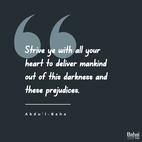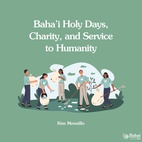The views expressed in our content reflect individual perspectives and do not represent the official views of the Baha'i Faith.
Action speaks louder than words but not nearly as often. – Mark Twain
Have you ever done something that violated your innermost principles?
Don’t feel alone—we’ve all acted in ways that made us ashamed later. Hypocrisy, that almost-universal human trait, afflicts just about everyone. It’s easy to believe in a high, noble principle–but quite a bit harder to always follow it.
No doubt you’ve seen the popular internet meme on this subject: “Your beliefs don’t make you a good person—your behavior does.”
Every human being faces that accident-prone intersection of inner beliefs and outer actions; the boundary layer that separates the well-intended from the well-behaved; the great gulf between words and deeds.
It’s always been this way. Many people have a tendency to believe in fine principles, to say they support the noblest and loftiest truths. But carrying them out? Actually practicing them? Well, it just so happens, that’s much, much harder to do.
The Baha’i teachings explain:
What profit is there in agreeing that universal friendship is good, and talking of the solidarity of the human race as a grand ideal? Unless these thoughts are translated into the world of action, they are useless.
The wrong in the world continues to exist just because people talk only of their ideals, and do not strive to put them into practice. If actions took the place of words, the world’s misery would very soon be changed into comfort.
A man who does great good, and talks not of it, is on the way to perfection.
The man who has accomplished a small good and magnifies it in his speech is worth very little.
If I love you, I need not continually speak of my love — you will know without any words. On the other hand if I love you not, that also will you know — and you would not believe me, were I to tell you in a thousand words, that I loved you.
People make much profession of goodness, multiplying fine words because they wish to be thought greater and better than their fellows, seeking fame in the eyes of the world. Those who do most good use fewest words concerning their actions. – Abdu’l-Baha, Paris Talks, p. 23.
In many important ways, this issue goes right to the heart of all religion. In fact, religion comes from the Latin word religio, which in ancient Roman times meant “the pious practice of scruples.” A scrupulous person, the Baha’i teachings say, exemplifies the primary purpose of the laws of God:
If a soul of his own accord advances toward God he will be accepted at the Threshold of Oneness, for such a one is free of personal considerations, of greed and selfish interests, and he has taken refuge within the sheltering protection of his Lord. He will become known among men as trustworthy and truthful, temperate and scrupulous, high-minded and loyal, incorruptible and God-fearing. In this way the primary purpose in revealing the Divine Law — which is to bring about happiness in the after life and civilization and the refinement of character in this — will be realized. – Abdu’l-Baha, The Secret of Divine Civilization, p. 46.
You don’t hear those two words much these days: scruples and scrupulous.
To be scrupulous means to have a conscience, a moral sense that distinguishes between right and wrong. We feel our scruples revolt when our deeds go against our moral values and make us remorseful; and we feel them even more strongly and positively when our deeds conform to our values and give us a sense of integrity, honesty and spiritual growth. Everybody understands these two powerful feelings.
Want to know where the word came from? A scruple, originally, was a small unit (℈) of apothecary weight–1/24 of an ounce–in the Roman system of weights and measures. Typically, you could measure a scruple as the weight of tiny pebble, one of those small stones that somehow gets stuck in your shoe. Those sandal-wearing (and slave-owning) Romans probably had to deal with lots of bothersome scruples. We’ve all had that happen, and we all know how much it can hurt, even though the stone seems so tiny. In the same way, the Romans probably figured, our small, nagging conscience won’t leave us alone when we’ve done something, or when we think about doing something, that we know is wrong.
Religion, at its very core, concerns itself with these basic concepts—with developing moral courage.
Why? Because the purpose of religion involves refining human character and actions. True religion goes far, far beyond any sermon or liturgy or prayer session or ritual or set of principles—instead, it asks us to truly change, to alter what we do, to make our actions God-like:
My friend, the aim of this life is not the acquirement of wealth, honour and glory, not the display of the animal attributes such as eating, sleeping and chasing worldly pleasures. Such aimless and insipid pursuits do not befit man who is endowed with divine effulgence and radiant longings. The object of this life is the attainment of the spirit, the manifestation of the fear of God, the attainment of the knowledge of God, the acquisition of the love of God, the attaining [of] the good pleasure of the Lord of mankind. If man characterizes himself with these God-like attributes he will become freed from all ties of this mortal world, the light of God will shine in his heart, he will hear the voice of the heavenly angels, he will be surrounded by the confirmations of the Holy Spirit, he will become an irradiating centre of the perfect names and qualities of the Merciful and a light through which the darkness of the world of humanity is dispelled! – Abdu’l-Baha, Star of the West, Volume 4, p. 155.
In this short series of essays on the difference between deeds and words, between principles and actions, we’ll look at the development of scruples; at the wisdom of having them; and at the risks and rewards of employing them in the real world. Please follow along as we try to understand what moral courage really means.

















Comments
Sign in or create an account
Continue with Facebookor